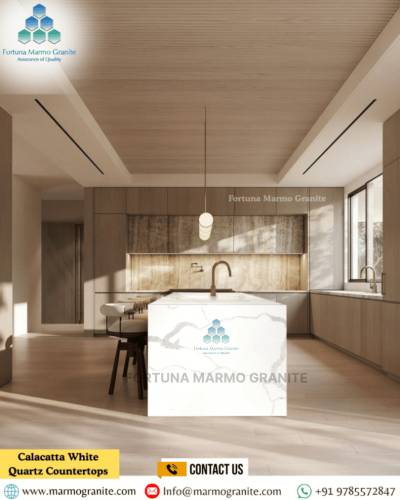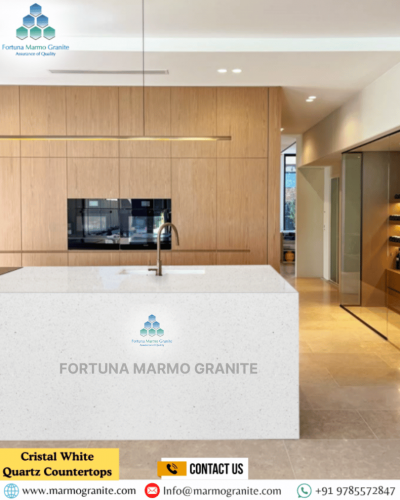How to Safeguard Quartz from Scratches: A Comprehensive Guide
How to Safeguard Quartz from Scratches Quartz countertops Quartz countertops have rapidly gained popularity in contemporary kitchens and bathrooms. Their appeal lies not only in captivating aesthetics but also in exceptional durability and low maintenance. These engineered surfaces combine natural quartz with resin to create a non-porous finish that resists stains, moisture, and bacterial growth, making them ideal for hygiene-conscious homeowners. With a wide range of colors and patterns, quartz complements various design styles, from sleek modern interiors to classic, timeless settings.
Despite their toughness, quartz surfaces are not completely scratch-proof. Everyday kitchen activities—like chopping, dragging heavy cookware, or placing abrasive objects—can mar the surface. Knowing how to protect your quartz countertops is essential to maintain their polished look and long-term value. This guide provides practical tips and expert insights on scratch prevention. Whether you are safeguarding a new installation or restoring an existing surface, these strategies help you keep your quartz countertops gleaming for years with minimal effort.


Understanding the Composition and Vulnerability of Quartz
Before exploring preventative measures, it's important to understand what quartz countertops are made of and why they can still scratch despite their hardness. Quartz countertops are engineered stones, usually composed of 90–95% ground natural quartz mixed with 5–10% polymer resins and pigments. This process produces a material that is significantly harder than natural stones like granite or marble.
On the Mohs Hardness Scale, which measures a mineral's resistance to scratching, quartz rates at 7. It is harder than glass (around 5.5) and most common household items. However, materials with equal or greater hardness—such as certain ceramics, hardened metals, or other quartz surfaces—can still scratch it. The polymer resins, which make the surface non-porous and slightly flexible, are softer than the quartz crystals and may be vulnerable under enough pressure.
The First Line of Defense: Implementing Preventative Measures
Embrace the Power of Trivets and Hot Pads:
Heat, while not directly causing scratches, can weaken the resin binders in quartz over time, potentially making the surface more susceptible to damage. Moreover, placing hot cookware directly on the countertop can cause thermal shock, leading to cracks or discoloration in extreme cases.
Actionable Steps:
- Always use trivets or hot pads: Place them under all hot pots, pans, baking dishes, and even heated serving ware before setting them on your quartz surface.
- Choose appropriate trivets: Opt for trivets made of cork, silicone, wood, or other heat-resistant materials. Ensure they are large enough to fully accommodate the base of the cookware.
- Be mindful of prolonged heat exposure: Avoid leaving hot items on the countertop for extended periods, even with a trivet.
Cutting Boards are Your Quartz's Best Friend:
Direct contact with sharp objects is a primary culprit behind scratches on any countertop surface, including quartz. Cutting, chopping, or slicing food directly on your quartz will inevitably lead to scratches, ranging from fine lines to more noticeable gouges.
Actionable Steps:
- Always use a cutting board: Regardless of the food item or the sharpness of your knife, make it a habit to use a cutting board.
- Choose the right cutting board: Opt for cutting boards made of wood, bamboo, or plastic. Avoid using glass or ceramic cutting boards, as these can be as hard as or harder than quartz and can potentially cause scratches themselves.
- Ensure stability: Place your cutting board on a stable surface to prevent it from slipping and causing accidental knife contact with the countertop.
Handle with Care: Avoiding Dragging and Dropping:
Accidental bumps and drops are inevitable, but reducing them can significantly lower the risk of scratches and chips. Dragging heavy or abrasive objects across the countertop often causes linear scratches.
Actionable Steps:
Lift, don't drag: Always lift heavy appliances, cookware, or decorative items instead of dragging them across the surface.
Use protective mats or coasters: Place mats under frequently moved or heavy appliances, such as stand mixers or coffee makers. Use coasters under items with rough or unpolished bases.
Handle sharp edges carefully: Be cautious with items that have sharp or rough edges, like ceramic dishes, metal utensils, or unfinished pottery.
Gentle Cleaning Practices: The Key to Long-Term Preservation:
Quartz is non-porous and easy to clean, but abrasive products or harsh scrubbing can dull its finish and create micro-scratches over time.
Actionable Steps:
Use mild soap and water: For daily cleaning, use a soft cloth or sponge with warm water and mild dish soap.
Avoid abrasive cleaners: Do not use harsh chemicals, scouring pads, steel wool, or abrasive powders. These can scratch the surface and harm the resin.
Wipe spills immediately: Clean spills promptly, especially acidic liquids like lemon juice or vinegar, to prevent potential etching or stains.
Dry with a soft cloth: After cleaning, use a soft microfiber cloth to dry the surface and maintain its shine.
Addressing Existing Scratches: When Prevention Wasn't Enough
- Identifying the Severity of the Scratch:
Before attempting any repair, carefully assess the scratch's depth and severity.
Superficial scratches: Fine lines that are mostly visible only upon close inspection. They do not catch your fingernail.
Moderate scratches: More noticeable lines that you can slightly feel when running your fingernail across them.
Deep scratches or chips: Significant indentations that are easily visible and can be felt distinctly.
- DIY Solutions for Minor Scratches:
For very superficial scratches, DIY methods may help improve their appearance, though complete removal is often difficult.
Quartz Scratch Repair Kits: Specialized repair kits for quartz surfaces are available. They usually include a polishing compound and detailed instructions. Always follow the manufacturer's guidelines carefully.
Baking Soda Paste: For light scratches, you can make a paste with baking soda and water. Gently rub the paste onto the scratch in a circular motion using a soft cloth, then rinse thoroughly. Always test this method in an inconspicuous area first.
- Seeking Professional Help for Deeper Damage:
For moderate to deep scratches, chips, or cracks, consult a professional stone restoration specialist. They have the expertise, tools, and materials to repair the damage effectively and seamlessly.
Why Professional Repair is Recommended:
Expertise and Experience: Professionals can accurately assess the damage and select the best repair method.
Specialized Tools and Materials: They use professional-grade polishing compounds, epoxy resins, and color-matching techniques to achieve flawless results.
Conclusion
Safeguarding quartz surfaces from scratches requires a comprehensive and consistent maintenance strategy that involves adopting preventive measures and proper cleaning techniques. Quartz, though known for its remarkable durability and resistance to everyday wear and tear, is not entirely impervious to scratches, making it vital to exercise caution during daily use. How to Safeguard Quartz from Scratches, To protect the surface effectively, always use cutting boards when preparing food to avoid direct contact with sharp utensils, as even the slightest nick can mar the surface over time.
Harsh chemical cleaners and scouring pads should be avoided, as they can cause micro-scratches that may not be immediately visible but can accumulate over time, gradually diminishing the quartz's polished finish. Regular maintenance that includes wiping down the surface with a gentle soap-and-water solution, promptly cleaning up spills to prevent stains, and using specialized quartz cleaners for stubborn residues can significantly extend the lifespan of the surface while preserving its natural beauty. How to Safeguard Quartz from Scratches, At Fortuna Marmo Granite, we emphasize the importance of maintaining quartz surfaces properly, offering our clients not only premium-grade quartz products but also expert guidance on protecting their investment and ensuring that the elegant, scratch-resistant finish remains intact for years to come.

